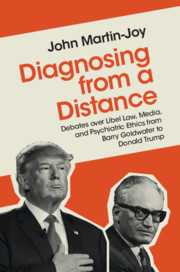 Diagnosing from a Distance
Diagnosing from a Distance Book contents
- Diagnosing from a Distance
- Diagnosing from a Distance
- Copyright page
- Dedication
- Contents
- About the Author
- Acknowledgments
- Abbreviations
- Introduction An Ethical Dilemma
- Chapter 1 Psychoanalysis, Media, and Politics from the Rise of Hitler to the 1950s
- Part I Diagnosis from a Distance and Libel Law in the 1960s: Goldwater v. Ginzburg
- Chapter 2 Ralph Ginzburg
- Chapter 3 “To Remove This Precedent”
- Chapter 4 Ginzburg, Goldwater, and the Supreme Court
- Part II Professionalization and the Rise of the Goldwater Rule
- Appendix The Goldwater Rule in 1973 and Today
- Photographs of Key People and Events
- Notes
- Works Cited
- Index
Chapter 3 - “To Remove This Precedent”
Barry Goldwater Sues for Libel
from Part I - Diagnosis from a Distance and Libel Law in the 1960s: Goldwater v. Ginzburg
Published online by Cambridge University Press: 29 February 2020
- Diagnosing from a Distance
- Diagnosing from a Distance
- Copyright page
- Dedication
- Contents
- About the Author
- Acknowledgments
- Abbreviations
- Introduction An Ethical Dilemma
- Chapter 1 Psychoanalysis, Media, and Politics from the Rise of Hitler to the 1950s
- Part I Diagnosis from a Distance and Libel Law in the 1960s: Goldwater v. Ginzburg
- Chapter 2 Ralph Ginzburg
- Chapter 3 “To Remove This Precedent”
- Chapter 4 Ginzburg, Goldwater, and the Supreme Court
- Part II Professionalization and the Rise of the Goldwater Rule
- Appendix The Goldwater Rule in 1973 and Today
- Photographs of Key People and Events
- Notes
- Works Cited
- Index
Summary
In the late 1950s, a new conservativism – in the form of William F. Buckley’s National Review and of Senator Barry Goldwater – emerged. I trace Goldwater’s response to the Fact magazine case following his 1964 defeat. I show how shocked he was by Fact, and his motivations for bringing a libel suit: a wish to protect future politicians and to counter what he saw as unethical forms of comment. Goldwater was ahead of his time and ahead of his conservative colleagues (Buckley included) in appreciating the political value of lawsuits. I also document the dynamic relationship between Goldwater and his supporters, and the American Medical Association and the American Psychiatric Association, with whom he had a de facto working alliance. Drawing on the trial transcript and on Goldwater’s extensive archives, I narrate the legal contest in all its drama. I provide political and social context, including the impact of the Vietnam War on the debates over ethics and politics but also the role of the media in shaping public opinion on the war and on the case. I also document an effort by Ginzburg’s Avant Garde magazine to survey psychiatrists about Lyndon Johnson’s fitness for office in 1968.
Keywords
- Type
- Chapter
- Information
- Diagnosing from a DistanceDebates over Libel Law, Media, and Psychiatric Ethics from Barry Goldwater to Donald Trump, pp. 86 - 121Publisher: Cambridge University PressPrint publication year: 2020


